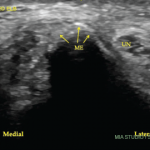The ACR’s “Report on Reasonable Use of Musculoskeletal Ultrasonography in Rheumatology Clinical Practice” makes it clear that using the technology for specific purposes is reasonable if conducted within the context of an overall clinical evaluation by a rheumatologist who has been trained in its use.1
“This report should help rheumatologists who are interested in performing musculoskeletal ultrasound [MSUS] blend it into their practice in an acceptable manner,” says Tim McAlindon, MD, MPH, chief of rheumatology at Tufts Medical Center and professor of medicine at Tufts University School of Medicine in Boston. The document “should stimulate thought about how we integrate ultrasound into fellowship training programs, how we train ourselves, and how we certify rheumatologists as competent in musculoskeletal ultrasound,” he says. Dr. McAlindon was principal investigator for the project and first author of the document.
The term “reasonable use” has significant meaning in the document. First, there is no requirement or implication that MSUS must be performed in a rheumatologic assessment, only that it can reasonably be used as an additional or complementary part of an evaluation and for specific purposes that are listed in the document. Second, reasonable use of MSUS, as defined in the document, means that the health benefits provided by MSUS will outweigh any adverse consequences. And third, MSUS should not be used if a clinical evaluation has already established a diagnosis with a high level of confidence.
“We wanted this to be viewed as an optional modality that rheumatologists could use, not as one that could be advocated as a standard of care,” says Timothy S. Shaver, MD, a member of the voting panel for the project. “I hope that more rheumatologists will consider using it and will be better educated about the broad spectrum of applications that MSUS has for rheumatology and will gain a better appreciation of the scope of the pathologies that MSUS can evaluate,” says Dr. Shaver, who is clinical associate professor at the University of Kansas and a rheumatologist in practice at Arthritis and Rheumatology Clinics of Kansas in Wichita.
William Arnold, MD, a rheumatology partner at Illinois Bone and Joint Institute, LLC, in Morton Grove, and a member of the project’s expert panel, says that, “for the first time, the document defines the field of rheumatology ultrasound as we understand it, based on literature review, expert panels, and use of the RAND/UCLA methodology.” It is not meant to be used as a “prescriptive” document, he adds, because it does not endorse any specific use of MSUS for any specific indication. “For the purposes of MSUS, the ACR has carved out part of the field and says these are reasonable procedures that rheumatologists can perform, but with two caveats: that it be done as part of a comprehensive evaluation that includes history, physical, and laboratory studies; also, it is assumed that the rheumatologist is able to perform the procedure.”

